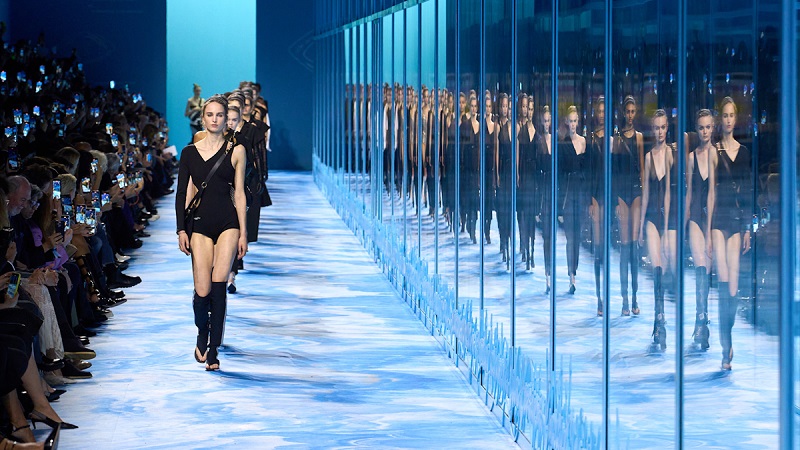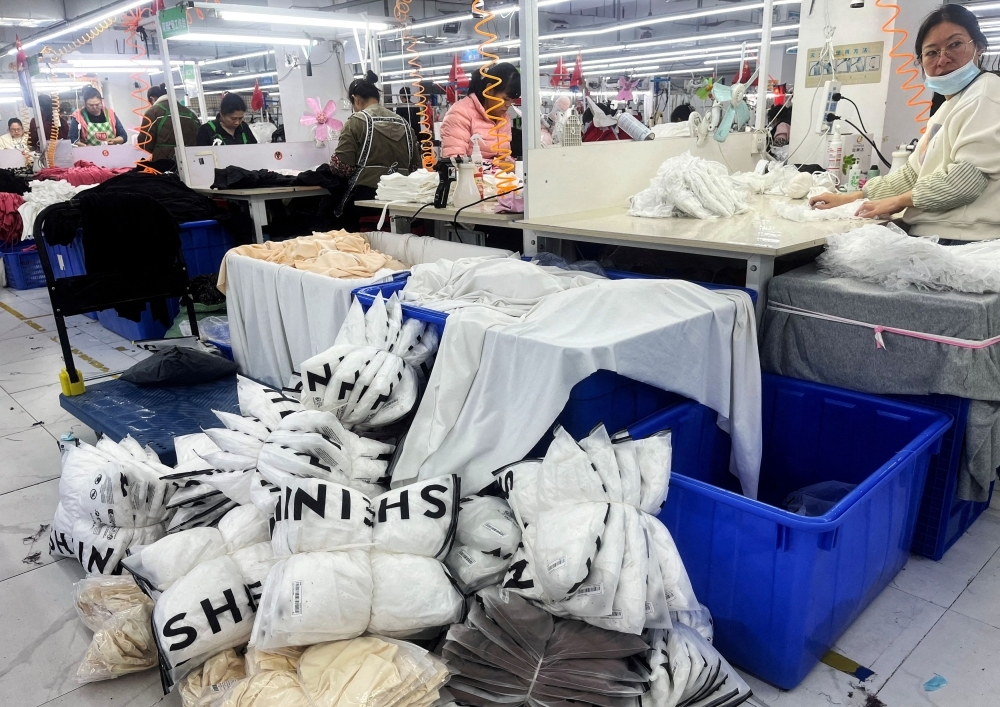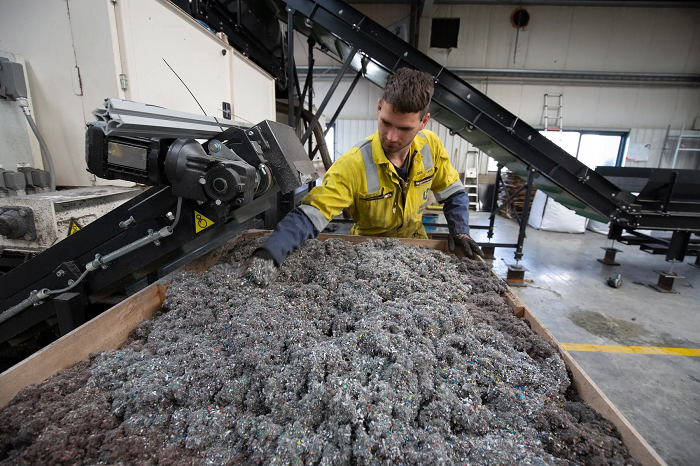FW
Stoll, Germany’s leading flat knitting machine manufacturer recently concluded its first Stoll Symposium at its New York City facility, in honor of its 145th anniversary. The event aimed to express gratitude towards key industry players that utilise Stoll’s machinery and services, as well as to educate designers and brands alike on the various knitting solutions and techniques available with Stoll.
The event featured seven key sessions that walked attendees through a technical leap in time from knitting applications to techniques to machinery throughout the years. They provided an in-depth comprehension of Stoll ADF & CMS techniques, Stoll-artwork, Stoll-autocreate, Stoll-knit and wear, yarn experience and usage, and technical textiles at Stoll.
The New York facility of Stoll America works with a wide range of highly skilled specialists to develop the shapes and patterns utilised by famous major American retail companies and knitwear designers.
Invista has developed a marketing campaign along with Refinery 29, a digital media and entertainment company for young women. Invista is the owner of the Lycra brand portfolio of spandex fibers.
The program advises consumers to look for advanced Lycra fiber technologies inside their clothes if they want to experience lasting comfort, fit and performance. The month-long campaign leverages key social media influencers on Refinery 29 to promote the benefits of jeans made with Lycra dualFX technology and active wear powered by Lycra Sport technology.
Custom videos and editorial content will be presented by fashion influencers promoting participating brands’ apparel across Refinery 29 and Lycra brand digital channels, as well as influencer-owned social media channels.
This campaign lets millennial women know that just as it’s what’s inside them that matters most—the same can be said about their jeans. Many of the most common frustrations women have about comfort, fit and shape retention are solved when the jeans have Lycra dualFX technology inside.
Indigo Ag, is offering Indigo Certified Cotton for the 2019 crop season. The cotton offers growers premier inputs to achieve higher yields and flexibility to decide how to market their fiber, while also emphasising sustainable growing practices. It covers dryland and irrigated acres with seed financed at 0 per cent. When marketing with indigo, growers will receive a premium on every acre of Indigo Certified Cotton sold. As with other crops within the Indigo Certified Crops program, growers may also market to buyers outside of the company.
Indigo’s microbial-treated seeds and data-driven agronomic support constitute the base of the offer; with the option to take advantage of Indigo’s other services. The offer reflects insights gathered from the company’s previous production season, and its continued commitment to the sustainable production of fiber. It also provides increased marketing flexibility, so that growers can choose to sell with Indigo or through their normal channels. And, this comprehensive offer includes access to data-based agronomic advice, allowing growers to improve their profitability and environmental sustainability.
Although in recent years there has been a renewed interest in clothing made in Britain, there are concerns that the demand for ‘fast fashion’ is fuelling the need for quick turnarounds in supply chain, leading to poor working conditions in UK garment factories. The Environmental Audit Committee launched an inquiry in June to investigate the social and environmental impact of ‘fast fashion’ and that of the wider clothing industry. The inquiry focuses on the carbon, resource and water use impacts of clothing throughout a garment’s entire lifecycle, while exploring options for recycling clothes at the end of life stage while reducing waste and pollution.
Evidence already submitted to the EAC has revealed that the UK has a higher consumption of new clothing than any other European country, with 26.7 kilogrammes (kg) per capita per year, far ahead of Germany on 16.7kg, while the global fashion industry produced around 1.2 billion tonnes of CO2 equivalent in 2015.
Fashion companies are being asked to provide evidence of their sustainability initiatives to reduce the environmental impact of fashion. The companies under the focus of EAC include: Marks & Spencer Group, Primark Stores, Next Retail, Arcadia Group, Asda, TK Maxx and HomeSense, Tesco, JD Sports Fashion, Debenhams and Sports Direct International.
As per VDMA Textile Care, Fabric and Leather Technologies meeting of trade associations in Munich, sales in the textile care, fabric and leather technologies sector rose 11.4 per cent in real terms from January to August 2018 compared to previous year. The German Engineering Federation (VDMA) represents more than 3,200 primarily medium-sized companies in the capital goods industry, making it the largest industrial association in Europe.
Elgar Straub, Managing Director, VDMA revealed exports by the sector, which brings together manufacturers of sewing and garment technology, shoe and leather technology as well as laundry and dry cleaning technology, increased 6.2 per cent in 2017 from €1.049 billion in 2016 to €1.114 billion in 2017.
Protectionist measures in the US and other parts of the world are exacerbating the free trade debate. The export-oriented mechanical engineering industry is dependent on open markets, especially small and medium-sized enterprises, which cannot react by relocating production.
European businesses expressed their support for signing and ratification of a free trade agreement between the European Union (EU) and Vietnam (EVFTA). The FTA will benefit European firms in many areas, including pharmaceuticals. It will strengthen multi-faceted partnership between the EU and Vietnam, bringing benefits to enterprises and people of both sides.
European investors in Vietnam will enjoy better assurances thanks to the Investment Protection Agreement (IPA), which has been separated from the EVFTA. As opportunities for business cooperation between the two are increasing due to their diversity and supplementary strengths, consumers on both sides will benefit from the process.
EU has supported Vietnam, through independent consultation experts, in building action plans and programmes to implement commitments stated in the deal. Both EVFTA and IPA have been translated into languages of EU countries and Vietnamese to be submitted to the European Commission (EC) and the Vietnamese government before the ratification process is undertaken in the European Parliament and Vietnam’s National Assembly.
Ethiopia will begin the development of three textile parks before July 2019. These centers will be built in: Aysha and Semera near Djibouti border and Assosa, next to Sudanese border. These parks will play a critical role in Ethiopia’s plan to transform its still largely agrarian economy into an industrialised one by 2025, using the textile and garment sector as a key component.
In addition to these facilities, Ethiopia will also develop four agro-industrial parks to capture more value from Ethiopia’s farming output. These will be built in the north eastern regions of Amhara, Oromia, Tigray and SNNPR.
Ethiopia has based its industrialisation effort on the development of low-carbon, tax-exempt “plug & play” industrial parks along development corridors. Ethiopia plans to increase the number of operational industrial parks from the current four to around 30 by 2025, increasing the share of the economy contributed by manufacturing from 5 per cent to 22 per cent.
Employment in the US textiles sector declined four per cent in 2017 from 2013. Reshoring has taken place in recent years, although on a modest scale. Total capital expenditures in plants and equipment for the textile sector increased 36 per cent from 2013 to 2016. Much of the new investment is by foreign firms, including new investments by Chinese and Indian firms, as well as by firms from Mexico, Canada, Turkey, and Saudi Arabia.
Firms are upgrading and modernizing their manufacturing processes and focusing their operations on different products. Employment in the apparel sector steadily declined during 2013-17, down 21 per cent. Labor productivity also declined during 2013–16.
Advantages of producing textiles in the United States include local and state incentives for investment, and the benefits afforded by free trade agreement preferences that encourage the use of US-produced inputs in downstream production in FTA partner countries, energy cost and the availability and reliability of high-quality cotton.
Advantages of producing apparel in the United States include improved lead times, better quality control, and more flexible production. The adoption of various automation and digital technologies to accelerate the process of product development improves the fit of the final product and reduces the need for skilled sewing operators.
Amid mounting social criticism, fashion businesses are adopting eco-friendly initiatives to preserve their brand value. Popular brand Stella McCartney, in its 2019 Spring/Summer Collection in Paris, has created an invitation that explains its use of environmentally conscious materials in the format of comics. The brand makes its clothes from sustainable materials such as recycled nylon.
Upcoming brand Marine Serre has used the upcycled method to create a new dress out of unsold clothing and material. Designers, in the current age of clothing abundance, feel no need to use new materials. For them, it is possible to create outstanding clothing with materials already available.
On September 6, Burberry announced it would no longer engage in mass disposal of unsold products. The BBC and other media outlets had reported in July that in fiscal 2017 alone Burberry disposed of products such as clothing and perfume worth about ¥4.2 billion, bringing significant criticism.
The LVMH conglomerate, with 70 brands under its umbrella, touts reducing carbon dioxide emissions and raising the use of renewable energy. H&M will use environmentally conscious materials in all of its products by 2030.
Eastman has developed a new eco-friendly cellulosic fiber named Naia. Naia can transform into luxurious, soft, and easy-to-care-for fabrics, garments made from Naia can be laundered at home, have excellent wrinkle recovery and pilling resistance, all without compromising its luster and silky hand.
The fiber is produced in a safe, closed-loop process where non-hazardous chemical solvents are recycled back into the system for reuse. This optimized, low-impact manufacturing process has a third party verified Life Cycle Assessment certification. Naia has a lower impact than other fibers such as generic modal, viscose and triacetate.
Eastman, based in the US, is a producer of advanced materials and specialty additives. With a portfolio of specialty businesses, Eastman delivers innovative products and solutions while maintaining a commitment to safety and sustainability. As a globally diverse company, it serves customers in more than 100 countries. The company employs approximately 14,000 people around the world. It is committed to improving sustainability in the textile industry and providing choices to designers seeking out sustainable yarns.
With Naia, sustainability does not mean compromising on design. This yarn is made with no hazardous solvents. In terms of greenhouse gas emissions, water use and impact on the ecosystem Naia has significantly lower environmental impact compared to natural fibers such as cotton and silk.












